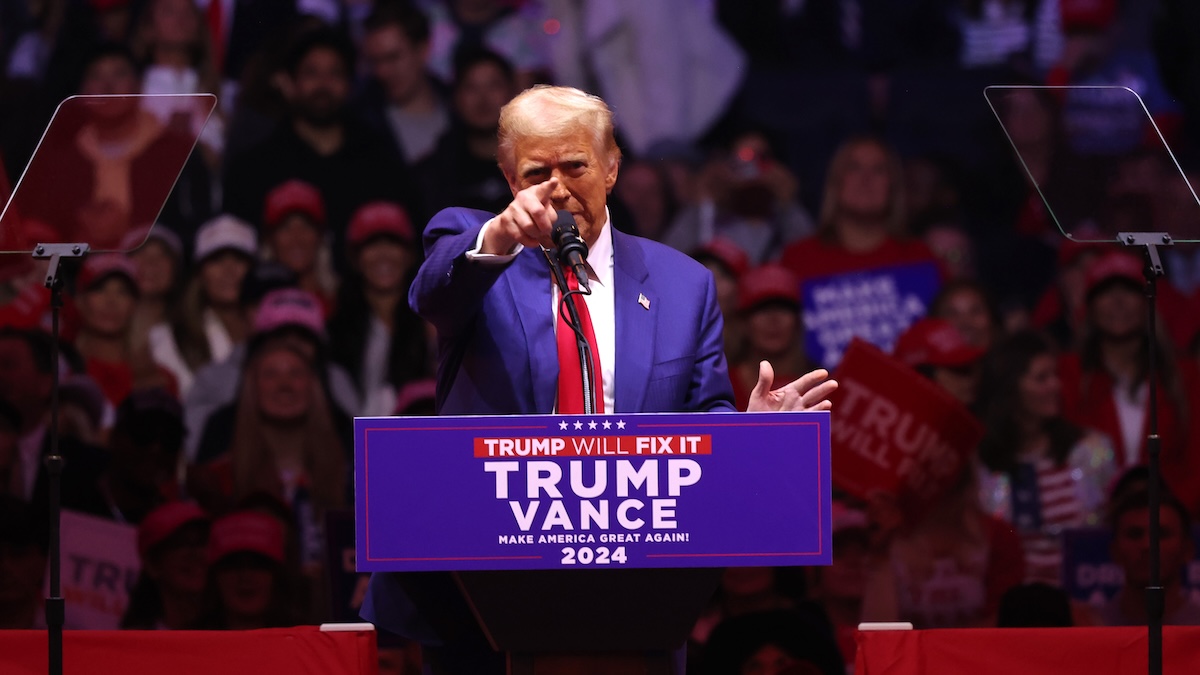‘They’ve unleashed war and chaos all over the world’: Donald Trump’s closing argument relies on racism and border panic

In the final days before the election, Donald Trump’s campaign faces mounting backlash over racist comments at the neo-Nazi crash-out event at Madison Square Garden, even as he doubles down on rhetoric about global chaos and border threats.
“They’ve unleashed war and chaos all over the world. No person [who] has caused so much destruction and death at home and abroad should ever be allowed to be president,” Trump declared on Tuesday at Mar-a-Lago, focusing his closing message on immigration and border security—his bread and butter topics.
Trump’s attempts to redirect attention from his controversial NYC rally have fallen flat. When asked about comedian Tony Hinchcliffe’s racist remarks about Puerto Rico, Trump claimed ignorance: “I don’t know him, someone put him up there.” He later praised the MSG event as “an absolute lovefest.”
His running mate, JD Vance, amplified the controversy, dismissing concerns entirely: “We have to stop getting offended at every little thing in the United States of America—I’m so over it.”
Trump’s weirdly toxic relationship with Hispanic voters, particularly Puerto Ricans, defies conventional political wisdom. Despite questioning the Hurricane Maria death toll and infamously tossing paper towels like basketballs during a 2017 visit to the devastated island, Trump maintained significant Latino support through 2020, even making gains in North Philadelphia’s Puerto Rican neighborhoods. His administration’s resistance to sending billions in hurricane aid and his private musings about selling the island somehow didn’t change Puerto Ricans’ (and other Hispanics) faith in someone who evidently could not care less about their existence.
It comes from internal politics—the internal self-stratification that occurs within Hispanic communities in various countries in Latin America. Puerto Ricans who supported Trump, as one example of many, did not see themselves like those other Hispanics. Trump was talking about those Latinos, those Central Americans, those Mexicans, over there. They have consistently misidentified their rivals. This electorate saw themselves as so white-adjacent that they could make their internal ‘others’ into scapegoats, in the way Trump has scapegoated all Hispanics.
The Madison Square Garden incident catalyzed unprecedented rejection from previously loyal supporters—out of the clearing of their self-induced fog of white adjacency. Victor Martinez, owner of Spanish language radio station La Mega in Allentown, captured the shift when describing a Trump-supporting caller who now opposes the former president. The combination of Hinchcliffe’s “floating island of garbage” comment, Trump’s refusal to personally denounce it, and Vance’s dismissive response has reverberated through WhatsApp groups and morning bodega conversations in ways previous controversies never did. As Norberto Dominguez, a Democratic precinct captain in Allentown, noted, “It’s spreading like wildfire through the community”—including through families split between Republican and Democratic voters.
In Pennsylvania, where approximately 500,000 Puerto Rican voters could decide the election, the controversy spread rapidly through WhatsApp groups and community networks. A nonpartisan Puerto Rican organization drafted a letter urging members to oppose Trump, while the Archbishop of San Juan demanded a personal apology.
Even the Republican Party chair in Puerto Rico threatened to withhold support unless Trump personally apologized. Campaign spokesperson Danielle Alvarez attempted damage control, stating the “joke does not reflect the views of President Trump or the campaign.”
At the Allentown event, Trump tried pivoting: “Nobody loves our Latino community and our Puerto Rican community more than I do.” But his refusal to address Hinchcliffe’s racism at his MSG event—which was, therefore, effectively a doubling down—only intensifies the earned criticism. He loves them as a punching bag, and perhaps Hispanics are finally tired of being hit and being told to enjoy it.
Have a tip we should know? [email protected]
